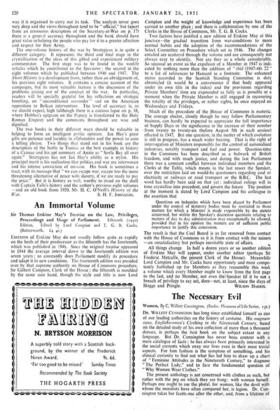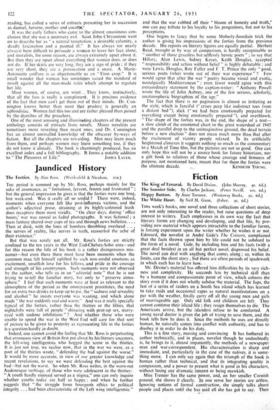The Necessary Evil
DR. Mum. CUNNINGTON has long since established himself as one of our leading authorities on the history of costume. His magnum opus, Englishwomen's Clothing in the Nineteenth Century, based on the detailed study of his own collection of more than a thousand dresses, is perhaps the best book on the subject extant in any language. But Dr. Cunnington has never been content with a mere catalogue of facts ; he has always been primarily interested in the social currents which sway our lives even in their most trivial aspects. For him fashion is the symptom of something, and his clinical curiosity to find out what has led him to draw up a chart of " Feminine Attitudes in the Nineteenth Century," to diagnose "The Perfect Lady," and to face the fundamental question of " Why Women Wear Clothes."
The present anthology is not concerned with clothes as such, but rather with the peg on which they are hung: with woman herself. Perhaps one ought to use the plural, for woman, like the devil with whom the moralists have often compared her, is legion. Dr. Cun- nington takes her facets one after the other, and, from a lifetime of reading, has culled a series of extracts presenting her in succession as damsel, heroine, mother and cocotte.-
It was the early fathers who came to the almost unanimous con- clusion that she was a necessary evil. Saint John Chrysostom went on to describe her as " a natural temptation, a desirable calamity, a deadly fascination and a painted ill." It has always (or nearly alwa}s) been difficult to persuade a woman to leave her face alone, and moralists, for some reason, are always extremely upset about it. But then they are upset about everything that woman does, or does not do. If her skirts are very long, they are a sign of pride ; if they are very short, they are a provocation and a snare. A Marie- Antoinette coiffure is as objectionable as an " Eton crop." It is small wonder that woman has sometimes raised the standard of revolt against all the man-made rules which attempt to regulate her life.
Most women, of course, are wiser.. They know, instinctively, that all the fuss is really a compliment. It is precious evidence of the fact that men can't get them out of their minds. Dr. Cun- nington knows better than most that prudery is generally an aphrodisiac. Women feel this too and are rather pleased than pained by the diatribes of the preachers.
One of the most amusing and illuminating chapters of the present anthology consists of extracts from novels. Minor novelists are sometimes more revealing than major ones, and Dr. Cunnington has an almost unrivalled knowledge of the obscurer by-ways of fiction. But all the chapters are rewarding. Men may learn much from them, and perhaps women may learn something too. if they do not know it already. The book is charmingly produced, has an excellent index and a full bibliography. It forms a notable addition







































 Previous page
Previous page